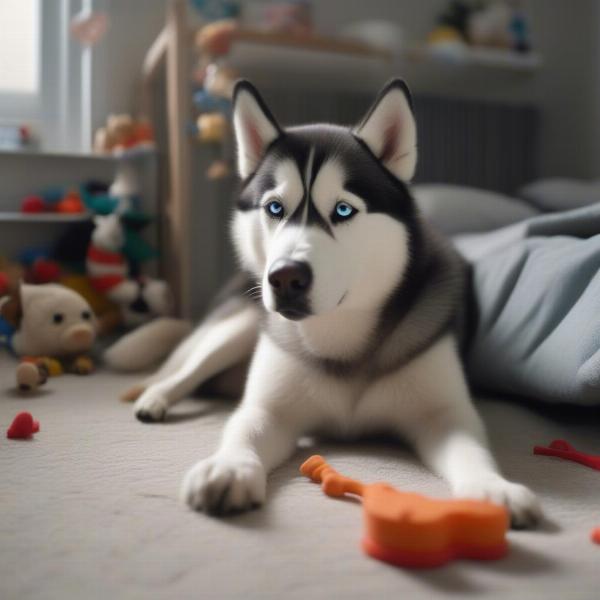If you’ve ever walked into a room to find your dog happily gnawing on their bed, you’re not alone. Many dog owners struggle with this frustrating behavior. This article explores the common reasons behind why dogs chew their beds, offering practical solutions to help you address this issue and preserve your dog’s bedding. We’ll delve into everything from teething puppies to anxious adults, providing actionable advice to ensure a comfortable and safe environment for your furry friend.
Understanding the Root of the Problem: Why Does My Dog Chew His Bed?
Dog bed chewing can stem from a variety of reasons. Pinpointing the underlying cause is crucial to effectively addressing the behavior. Is your dog a puppy? Teething could be the culprit. For adult dogs, boredom, anxiety, or even underlying medical conditions can contribute to this destructive habit. Let’s explore these potential causes in more detail.
Teething Puppies: A Natural Urge to Chew
Puppies experience discomfort and pain during teething, and chewing helps relieve this pressure. Providing appropriate chew toys can redirect this natural instinct away from their bed.
Boredom and Lack of Stimulation
 Bored Dog Chewing Bed
Bored Dog Chewing Bed
A bored dog will often find ways to entertain themselves, and unfortunately, this can include chewing on their bed. Ensuring adequate physical exercise and mental stimulation is essential for preventing destructive behaviors. Consider puzzle toys, interactive games, or simply spending more time playing with your dog.
Anxiety and Stress: Chewing as a Coping Mechanism
For some dogs, chewing provides comfort and stress relief. Separation anxiety, loud noises, or changes in routine can trigger this behavior. Identifying and addressing the source of anxiety is key, and in some cases, professional help from a veterinarian or certified dog trainer may be beneficial.
Medical Reasons: Don’t Overlook Potential Health Issues
In certain situations, underlying medical conditions can contribute to excessive chewing. Dental problems, nutritional deficiencies, or even cognitive decline can manifest in this behavior. Consulting with your veterinarian is important to rule out any potential health concerns.
Solutions and Strategies to Stop Bed Chewing
Once you understand why your dog is chewing their bed, you can implement strategies to curb this behavior.
Provide Appropriate Chew Toys: A Variety is Key
Offering a variety of chew toys with different textures and materials can help satisfy your dog’s chewing instincts. Consider toys made of durable rubber, nylon, or rope.
Increase Exercise and Mental Stimulation: A Tired Dog is a Good Dog
Regular exercise, both physical and mental, is crucial for a well-behaved dog. Daily walks, playtime, and puzzle toys can keep your dog engaged and prevent boredom-related chewing.
Create a Safe and Comfortable Environment: Reducing Anxiety Triggers
Minimizing stress and anxiety can significantly reduce destructive behaviors. Creating a calm and predictable environment, along with providing a safe space for your dog, can help them feel secure.
Training and Positive Reinforcement: Rewarding Good Behavior
Positive reinforcement training methods can be effective in teaching your dog what is acceptable to chew on. Rewarding them when they chew on their toys reinforces good behavior and discourages bed chewing.
Conclusion: A Comfortable Bed for a Happy Dog
Addressing dog bed chewing involves understanding the underlying cause and implementing appropriate solutions. By providing a stimulating environment, offering appropriate chew toys, and addressing any potential anxiety or medical issues, you can help your dog break this habit and enjoy a comfortable, undamaged bed. Remember, consistency and patience are key to achieving long-term success.
FAQ:
- Why does my puppy chew his bed so much? Puppies often chew due to teething pain and exploring their environment.
- Is it dangerous for my dog to chew on his bed? Ingesting bed stuffing can cause intestinal blockage, so it’s important to address the behavior.
- What are the best chew toys for my dog? Durable rubber, nylon, and rope toys are good options.
- How can I manage my dog’s anxiety? Create a calm environment, provide a safe space, and consider professional help if needed.
- When should I consult a veterinarian about my dog’s chewing? If the chewing is excessive, sudden, or accompanied by other symptoms, consult your vet.
dog electric blanket
dog friendly restaurants bozeman
dog crate mat indestructible
beaded dog necklace
About ILM Dog: ILM Dog is your trusted resource for expert advice on dog care and wellbeing. We offer comprehensive guidance on breed selection, health, training, nutrition, grooming, and much more. From puppy care to senior dog support, our expertise covers all life stages. For personalized advice and support for your furry friend, reach out to us at [email protected] or call us at +44 20-3965-8624.